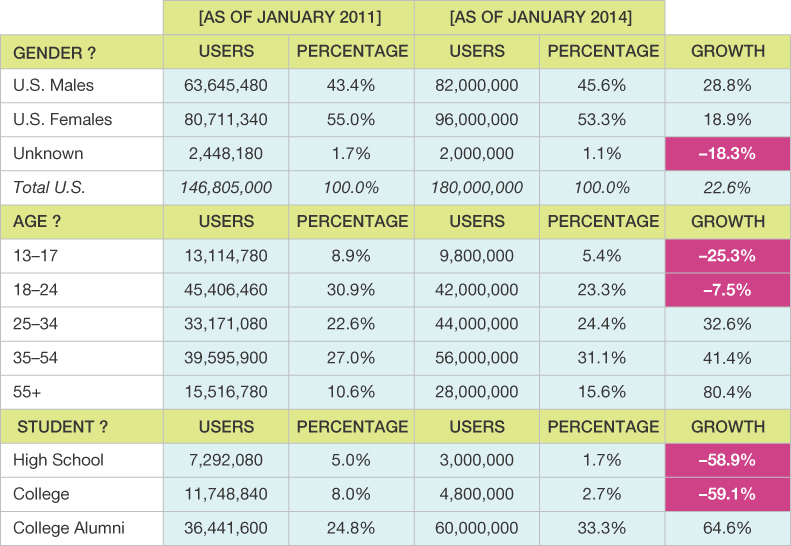9.21
Facebook Sonnet
Sherman Alexie

A Spokane/Coeur d’Alene Indian, Sherman Alexie (b. 1966) grew up in Wellpinit, Washington, on the Spokane Indian Reservation. He is the author of over twenty books, including The Absolutely True Diary of a Part-
Welcome to the endless high-
Reunion. Welcome to past friends
And lovers, however kind or cruel.
Let’s undervalue and unmend
5The present. Why can’t we pretend
Every stage of life is the same?
Let’s exhume, resume, and extend
Childhood. Let’s all play the games
That occupy the young. Let fame
10 And shame intertwine. Let one’s search
For God become public domain.
Let church.com become our church.
Let’s sign up, sign in, and confess
Here at the altar of loneliness.
seeing connections
In early 2014, Facebook started to become aware that the demographics of its users were changing, as seen in this chart:

What can you conclude from this graphic and what might the reaction of the speaker of this poem be to this data? To what extent does it reflect your and your friends’ experiences with social media?
Understanding and Interpreting
Make an inference about the approximate age of the speaker of the poem. Explain which lines from the poem support your inference.
What does it mean to “undervalue and unmend / The present” (ll. 4–
5)? How can social media, like Facebook, accomplish this? On what specific aspects of Facebook and social media does the speaker choose to focus? What aspects does the speaker choose to ignore? How do these choices reveal the speaker’s attitude toward social media?
Throughout the poem, there are references to aspects of religion. What point is the speaker trying to make with these references?
Analyzing Language, Style, and Structure
Reread lines 7–
9. What is Alexie hoping to achieve by comparing Facebook and childhood? In addition to using end-
line rhyming, Alexie uses internal rhyme in lines 9– 10. How does he use rhyme illustrate his point about social media? Alexie uses forms of the first person plural—
let’s, we, our—throughout his poem. How would the effect be different had he used other pronouns, such as I, me, my, they, or you? There are several instances where Alexie uses verbal irony, which is a discrepancy between what is said and what is actually meant. Identify words or phrases that he uses ironically and explain how this irony helps make a point about social media relationships.
The poem follows the structure of a sonnet, with fourteen total lines, a rhyming pattern, and a rhyming couplet in the last two lines. In what ways does Alexie’s choice of structure reflect the poem’s theme?
Connecting, Arguing, and Extending
The last line of the poem suggests that people who use Facebook are lonely. Write an argument in which you agree with, disagree with, or qualify. You can reference your own and others’ experiences, as well as this excerpt from an article by Stephen Marche called “Is Facebook Making Us Lonely?”
The idea that a Web site could deliver a more friendly, interconnected world is bogus. The depth of one’s social network outside Facebook is what determines the depth of one’s social network within Facebook, not the other way around. Using social media doesn’t create new social networks; it just transfers established networks from one platform to another. For the most part, Facebook doesn’t destroy friendships—
but it doesn’t create them, either. Alexie says that on social media, fame and shame intertwine. Explain why you agree or disagree with this statement, or if you would modify it in some way to make it closer to the truth.